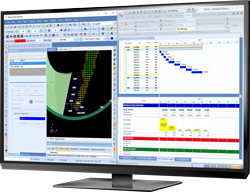Deswik Suite 2017.1
Deswik is pleased to announce the release of Deswik.Suite 2017.1, a major release featuring 254 enhancements and two new modules.
Key highlights from this release include:
- A myriad of enhancements to the Deswik Suite: watch this video for a detailed overview of some of the new functionality.
- A major new feature aimed at simplifying Open Pit Short Term Scheduling (OPSTS)
- Some major improvements to our Open Pit Drill & Blast module – Deswik.OPDB
- Two new modules: Deswik.DO (Dig Optimizer), Deswik.JF (Joint Finder)
WHAT’S NEW?
In this 6-minute video, we take you through an overview of some enhancements from this release, such as:
- Improvements to the interactive filter and formula builder in Deswik.CAD
- New deviation coloring tool
- New filtering and reporting tools in Deswik.Sched.
NEW TOOL
 OPEN PIT SHORT-TERM SCHEDULING: Short-range ore control modeling & design tool
OPEN PIT SHORT-TERM SCHEDULING: Short-range ore control modeling & design tool
- Simple user interface and workflow
- Interactive scheduling – dynamically links Deswk.CAD to Deswik.Sched
- Fast graphical and scheduling changes
- Powerful reporting capability (spatial data, animations, Gantt chart schedules)
- Solids modeling for accurate volumetrics and transparency
- Integrated for upstream and downstream stakeholders (ie. drill and blast engineers, long term planners and middle planners).
DESWIK.OPDB (Open Pit Drill & Blast)
Version 2017.1 comes with some exciting new features to our open pit drill & blast module, such as the ability to move holes to the limit line, edit hole format or analyze wind zones. Find out more by watching this summary video.
NEW MODULES
- Deswik.DO (Dig Optimizer)
Design of optimum dig lines for open pit grade control
Deswik.DO designs dig lines that minimize the dollar loss associated with the dig line misclassification of ore types for a given minimum mining width. It lets you quickly evaluate various minimum mining widths and cutoff grades. This allows the selection of a dig line set that best satisfies current short-term mine plan targets while taking into account mineral continuity as mining progresses through the deposit.
- Deswik.JF (Joint Finder)
Automated detection of joints in rock walls through the analysis of point cloud data
Deswik.JF automates joint mapping from the scan of a rock face. The user enters a point cloud file (3D coordinates) and input parameters, and Deswik.JF delivers the estimated joints in that wall. Typical execution times are up to 2min. Achieving the same results manually, on the screen, would take hours or days.
For more information, contact your nearest Deswik office.



